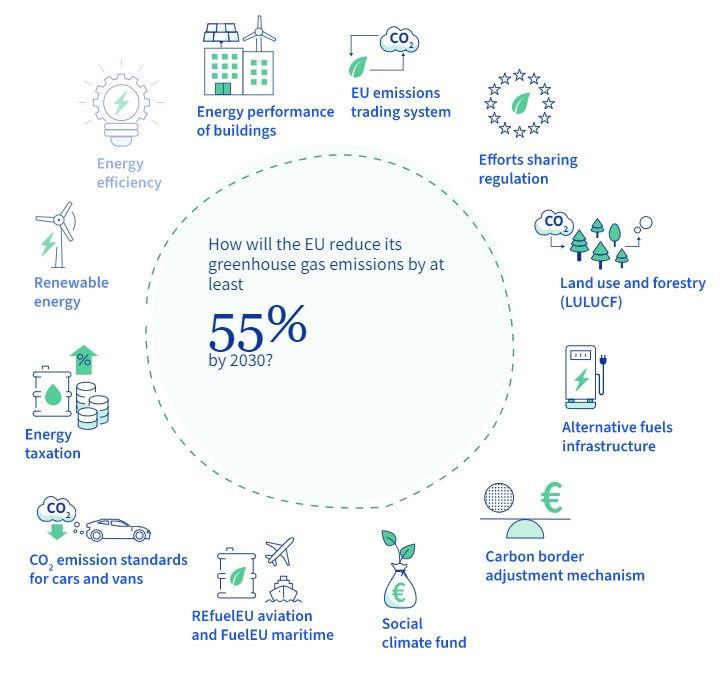The EU’s Fit for 55 deal, which legally obligates member States to reduce carbon emissions 55% by 2030, took another step forward recently with new details on decarbonizing buildings. Buildings make up one of twelve components in the deal and are at least partially responsible for approximately 36% of energy-related emissions in the bloc. On October 25, the European Council announced that the EU member states had agreed to stricter rules around building performance, specifically requiring all buildings built in 2030 or later to be net-zero and all building stock to be decarbonized by 2050. The Council is also proposing that all new public or non-residential buildings over 250 square meters have rooftop solar by 2026, extending to all new residential buildings by 2029. Next, the buildings directive will move to the European Parliament for negotiations.
What would these building performance requirements mean for building decarbonization in the EU? Immediately, major funding would flow to EPC firms and contractors for clean government and commercial building projects. Retrofits and home construction would see the next influx of investment. The solar industry could receive a boost as well, depending on how the solar installation requirements fare among Council members. More generally, the entire construction and building sector, already under pressure to reduce its footprint, should plan to make high performance retrofits and green building the standard of doing business by 2030.
The influx of funds and regulation would change the calculus for decarbonizing buildings and infrastructure. Drawing on The Climate Board’s previous research, Accelerating Decarbonization in Transportation and Infrastructure, some of our strategy recommendations look a bit different now. The agreed-upon building rules will go a long way to breaking down the structural barriers hindering the adoption of greener methods and materials in the construction industry.
- Recommendation One: Treat cost-saving measures as opportunities to develop decarbonization skills. Skill development is even more critical in the immediate term before the adoption of new requirements because companies now face a strict timeline to develop the expertise needed for green new builds and retrofits on a massive scale. Building that expertise will position the most advanced businesses to win more green contracts later.
- Recommendation Two: Seek out “springboard” projects that feature conditions well-suited to decarbonization, and use them as proof points for new materials and methods. This imperative, and our recommendations for how to identify potential springboards, will still ring true, but the number of projects that are opportunities for green building practices will skyrocket. Companies will likely not have to work as hard to foster, create, and win bids for these springboard projects.
- Recommendation Three: Adopt collaborative and transparent decision-making processes that facilitate carbon-conscious project design. With more stakeholders in the design and build process thinking about carbon, collaboration and multi-stakeholder decision making will become much easier. Still, make sure your company is among those leading the pack in integrating carbon considerations into projects.
Of course, buildings are only one of the areas covered in Fit for 55, so stay tuned as the full Fit for 55 package takes shape and The Climate Board shares additional insight into how the rules will impact businesses’ transition planning. Even companies outside the EU should keep track of how the building and construction industry adapts to a rapid shift in the regulatory environment there, both to remain competitive in the EU and to prepare for similar rules trickling into other markets; the global state of play in construction and buildings will likely shift toward the EU standard, albeit more gradually.
Revisit Accelerating Decarbonization in Construction and Infrastructure for the full list of recommendations and look forward to our upcoming research on fleet electrification and corporate power purchase agreements!





